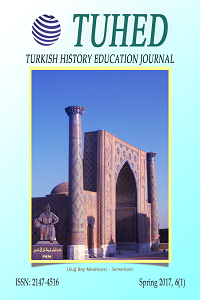Abstract
Türkiye’de
Cumhuriyet dönemi eğitim-öğretim seferberliğinin önemli bir ayağı da Köy
Eğitmen Kursları’dır. Okuma-yazma oranının yükseltilmesi ve eğitim-öğretim
seferberliğinde kır-kent dengesinin sağlanabilmesi adına açılmış olan bu
kurslar, 1930’lu yıllarda Türkiye’nin kalkınma noktasında köy ve köylü üzerinde
etkili olan bir yapıdır. Aynı zamanda Köy Eğitmen Kursları, Köy Enstitülerine
de zemin hazırlayan temel birimdir. Bu bakımlardan araştırılmaya değer bir
konudur. Bu araştırma ile Cumhuriyet dönemindeki eğitim boşluğunu dolduran Köy
Eğitmen Kursları'nın açılışı, yapısı ve işleyişinin köy okullarındaki başarı ve
istikrarın sağlanmasına ayrıca o yıllarda nüfusun %80’ini oluşturan köylüye ve
köy kalkınmasına katkısı değerlendirilmiştir.
Keywords
References
- Ahmet Tevfik (1328).Darulmualliminler çiftlik mektepleri. Yeni Mektep, S. 9. Kanun-ı Sani.
- Akyüz, Y. (1994).Türk eğitim tarihi (Başlangıçtan 1993’e). İstanbul: Kültür Koleji Yayını.
- Akyüz, Y. (2010). Türk eğitim tarihi (M.Ö. 1000-M.S. 2010). Ankara: Pegem A.
- Ayas, N. (1948). Türkiye Cumhuriyeti Milli Eğitimi; kuruluşlar ve tarihçeler, Ankara: MEB.
- Aydın, M.,Tekiroğlu, M. (2013). 1934 İzmir tedrisat müfettişleri kongresi: görüşler, sorunlar ve öneriler. Belgi, S. 5, Kış.
- Baltacıoğlu, İ. H. (1939). Eğitmen ve pedagojide Türk’e doğru. Yeni Adam, S. 237, 13 Temmuz.
Abstract
‘VillageInstructor Courses’ are considered
as one of the most important pillars of the Early Republican Era in Turkey.
These courses, which were specifically designed to improve the literacy rate
and mobilisation of education and training systems in urban and rural areas,
had a major impact on villages and villagers back in the 1930s, when the new Turkish
Republic was gradually developing. Furthermore, these courses formed a
prominent basis for Village Institutes, which relatively suggests that thiss tudy is worthwhile
to explore in further research.
The study will thus investigate into the structure and implementation of the Village
Instructor Courses in the Early Republican Era in Turkeyfor how they filled the
education gap of the time, helped achieve stability and success in villages and
finally contributed to educating villagers who at that time comprised 80% of
the population.
Keywords
References
- Ahmet Tevfik (1328).Darulmualliminler çiftlik mektepleri. Yeni Mektep, S. 9. Kanun-ı Sani.
- Akyüz, Y. (1994).Türk eğitim tarihi (Başlangıçtan 1993’e). İstanbul: Kültür Koleji Yayını.
- Akyüz, Y. (2010). Türk eğitim tarihi (M.Ö. 1000-M.S. 2010). Ankara: Pegem A.
- Ayas, N. (1948). Türkiye Cumhuriyeti Milli Eğitimi; kuruluşlar ve tarihçeler, Ankara: MEB.
- Aydın, M.,Tekiroğlu, M. (2013). 1934 İzmir tedrisat müfettişleri kongresi: görüşler, sorunlar ve öneriler. Belgi, S. 5, Kış.
- Baltacıoğlu, İ. H. (1939). Eğitmen ve pedagojide Türk’e doğru. Yeni Adam, S. 237, 13 Temmuz.
Details
| Journal Section | Research & Theoretical Articles |
|---|---|
| Authors | |
| Publication Date | May 21, 2017 |
| Submission Date | June 11, 2016 |
| Acceptance Date | February 16, 2017 |
| Published in Issue | Year 2017 Volume: 6 Issue: 1 |
Cited By
Köy Okullarındaki Eğitim Kahramanlarının Zorluklarla Dolu Yolculuğu: Öğretmen ve İdarecilerin Karşılaştığı Sorunlar
Eğitim Ve İnsani Bilimler Dergisi: Teori Ve Uygulama
https://doi.org/10.58689/eibd.1376686
İLKOKULLARA ÖĞRETMEN YETİŞTİRME (1923-2018)
Milli Eğitim Dergisi
https://doi.org/10.37669/milliegitim.824834
Legal Resilience in an Era of Gray Zone Conflicts and Hybrid Threats
SSRN Electronic Journal
Aurel Sari
https://doi.org/10.2139/ssrn.3315682
Sınıf Dışı Öğrenme Ortamları: Köy Enstitüleri Örneği
Turkish History Education Journal
Meral METİN GÖKSU
https://doi.org/10.17497/tuhed.626781
ANNOUNCEMENTS:
1- APA7 Referencing Style:
As of May 2024, TUHED will follow APA 7 (American Psychological Association) style for referencing and citation. For more information, please refer to the TUHED template and writting guidelines.
2- Early Release:
According to the TUHED's new publication policy, the articles which have completed the evaluation process will be published online-first. It will no longer be necessary for manuscripts to wait until the “next issue”. Early Release articles will receive an international identification code (DOI), and identified page numbers.
3- Ethics Committee Approval:
In accordance with the ULAKBİM decision of 25 February 2020, Ethics Committee Approval must be obtained for studies on people (without age restrictions), this approval must be specified in the Method section of the article and signed Ethics Committee Approval must be uploaded to the system. Applications that do not meet these requirements will not be considered for publication.
4- New Publication Policy
Beginning from Spring 2021 issue TUHED will require all Turkish manuscripts to contain a full-text English translation. Manuscripts submitted in Turkish will be requested to have full-text English translation if they are accepted for publication after the review process.
Turkish History Education Journal site and its metadata are licensed under a Creative Commons Attribution-NonCommercial 4.0 International License
Permissions beyond the scope of this license is available at COPYRIGHT


